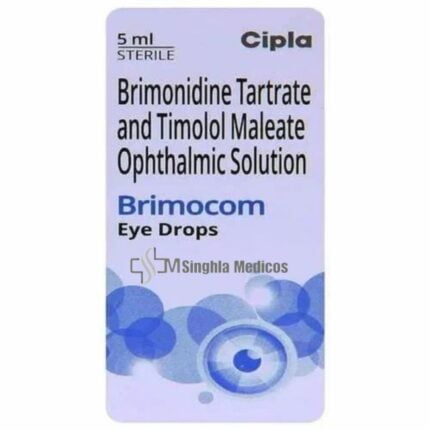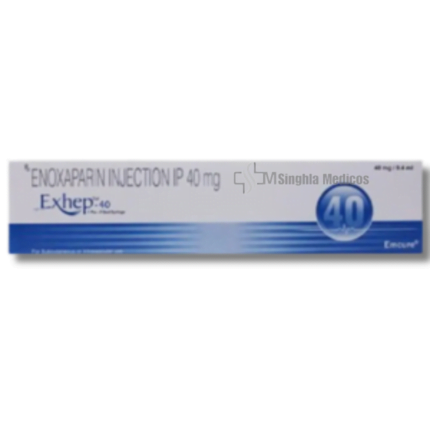

Brilinta 90mg Tablet
₹538.00 Original price was: ₹538.00.₹430.40Current price is: ₹430.40.
![]() Prescription Required
Prescription Required
Salt : Ticagrelor (90mg)
Manufacturer : AstraZeneca
Packing : 14 tablets in 1 strip
PRODUCT INTRODUCTION
Brilinta 90mg Tablet is a revolutionary medication designed to combat cardiovascular diseases, particularly those stemming from arterial blockages. Manufactured by AstraZeneca, this medication contains the active ingredient Ticagrelor, a potent antiplatelet agent. Brilinta belongs to a class of drugs known as P2Y12 inhibitors, which work by preventing blood platelets from sticking together and forming clots. Unlike its predecessors, Brilinta boasts a unique mechanism of action that ensures swift and consistent platelet inhibition, even in patients with genetic variations affecting drug metabolism.
The tablet is formulated for oral administration and is available in a convenient 90mg dosage strength. Brilinta is often prescribed in conjunction with aspirin for the prevention of heart attacks, strokes, and other cardiovascular events in patients with acute coronary syndrome (ACS), including those with unstable angina or myocardial infarction (heart attack). Its efficacy in reducing the risk of recurrent cardiovascular events has made it a cornerstone in the management of ACS patients worldwide.
USES OF Brilinta 90mg Tablet
Brilinta 90mg Tablet is prescribed for various conditions related to cardiovascular health, primarily focusing on acute coronary syndrome. Some of its key uses include:
- Prevention of Heart Attacks and Strokes: Brilinta, when taken in combination with low-dose aspirin, significantly reduces the risk of recurrent heart attacks, strokes, and cardiovascular death in patients who have previously experienced an acute coronary event.
- Management of Acute Coronary Syndrome: Brilinta is instrumental in the management of acute coronary syndrome, including unstable angina and myocardial infarction, by preventing blood clots that could lead to further cardiovascular complications.
- Secondary Prevention in High-Risk Patients: It is also prescribed for long-term use in patients with a history of ACS to lower the risk of subsequent cardiovascular events, thereby improving overall prognosis and quality of life.
BENEFITS OF Brilinta 90mg Tablet
Brilinta 90mg Tablet offers several significant benefits for patients at risk of cardiovascular events:
- Superior Efficacy: Clinical trials have demonstrated that Brilinta, when compared to older antiplatelet agents like clopidogrel, provides superior and more consistent platelet inhibition, resulting in reduced rates of recurrent cardiovascular events.
- Rapid Onset of Action: Brilinta exhibits a rapid onset of action, with platelet inhibition occurring within 30 minutes of administration, ensuring swift protection against clot formation.
- Lower Mortality Rates: Studies have shown that Brilinta, in combination with aspirin, reduces the risk of cardiovascular death and all-cause mortality in ACS patients, making it an indispensable component of modern cardiovascular therapy.
- Improved Tolerability: Brilinta has been associated with lower rates of major bleeding compared to other antiplatelet agents, offering a favorable safety profile without compromising efficacy.
SIDE EFFECTS OF Brilinta 90mg Tablet
While Brilinta is generally well-tolerated, like any medication, it may cause side effects in some individuals. Common side effects associated with Brilinta 90mg Tablet include:
- Bleeding: The most significant side effect of Brilinta is an increased risk of bleeding, including minor bleeding such as nosebleeds, bruising, or gastrointestinal bleeding, as well as more severe bleeding events like intracranial hemorrhage. Patients at higher risk of bleeding, such as those with a history of bleeding disorders or recent surgery, should be closely monitored while taking Brilinta.
- Dyspnea (Shortness of Breath): Some patients may experience dyspnea or difficulty breathing while taking Brilinta, particularly during the initial stages of treatment. This side effect is usually mild to moderate in severity and typically resolves spontaneously over time.
- Bradycardia (Slow Heart Rate): Brilinta may cause bradycardia or a slow heart rate in some patients, especially those with pre-existing conduction abnormalities. Monitoring of heart rate is recommended, particularly in patients with a history of bradyarrhythmias or those taking concomitant medications that can affect heart rate.
- Allergic Reactions: Although rare, allergic reactions to Brilinta, such as rash, itching, or swelling of the face, tongue, or throat, may occur. Patients experiencing signs of an allergic reaction should seek immediate medical attention.
References
-
Weitz JI. Blood Coagulation and Anticoagulant, Fibrinolytic, and Antiplatelet Drugs. In: Brunton LL, Chabner BA, Knollmann BC, editors. Goodman & Gilman’s: The Pharmacological Basis of Therapeutics. 12th ed. New York, New York: McGraw-Hill Medical; 2011. pp. 871-72.
-
Fox KA, White HD, Gersh BJ, et al. Antithrombotic Agents: Platelete Inhibitors, Acute Anticoagulants, Fibrinolytics, and Chronic Anticoagulants. In: Opie LH, Gersh BJ, editors. Drugs for the Heart. 8th ed. Philadelphia, Pennsylvania: Elsevier Saunders; 2013. pp. 351-52.
-
Briggs GG, Freeman RK, editors. A Reference Guide to Fetal and Neonatal Risk: Drugs in Pregnancy and Lactation. 10th ed. Philadelphia, PA: Wolters Kluwer Health; 2015. pp. 1359-60.
Disclaimer
Singhla Medicos’s primary intention is to ensure that its consumers get information that is reviewed by experts, accurate and trustworthy. The information and contents of this website are for informational purposes only. They are not intended to be a substitute for professional medical advice, diagnosis, or treatment. Please seek the advice of your doctor and discuss all your queries related to any disease or medicine. Do not disregard professional medical advice or delay in seeking it because of something you have read on Singhla Medicos. Our mission is to support, not replace, the doctor-patient relationship.
Shipping Policy
We ship across India. Note – this is subject to change as per Company Wishes. Packages will be shipped in 24 working hours. we are closed on Sundays and will reach you in the next 2-4 days post shipping. We give the estimated time of delivery on the shipping page. However, these are indicative and depend on our shipping partner.
Delivery
The delivery times are subject to location, distance, and our logistics partners. We are not liable for any delays in delivery by the courier company/postal authorities but will help you track down a package through our partner courier services.
Your purchases may reach you from various locations in more than one package. But rest assured, you will be charged one delivery fee for the entire order. As soon as your package ships, we will email you your package tracking information.
We are bound in coverage by their reach even though we use some of India’s largest logistics companies for shipping. In case your address is in a location not served by them we would contact you to find an alternative solution to make your products reach you.












Reviews
There are no reviews yet.